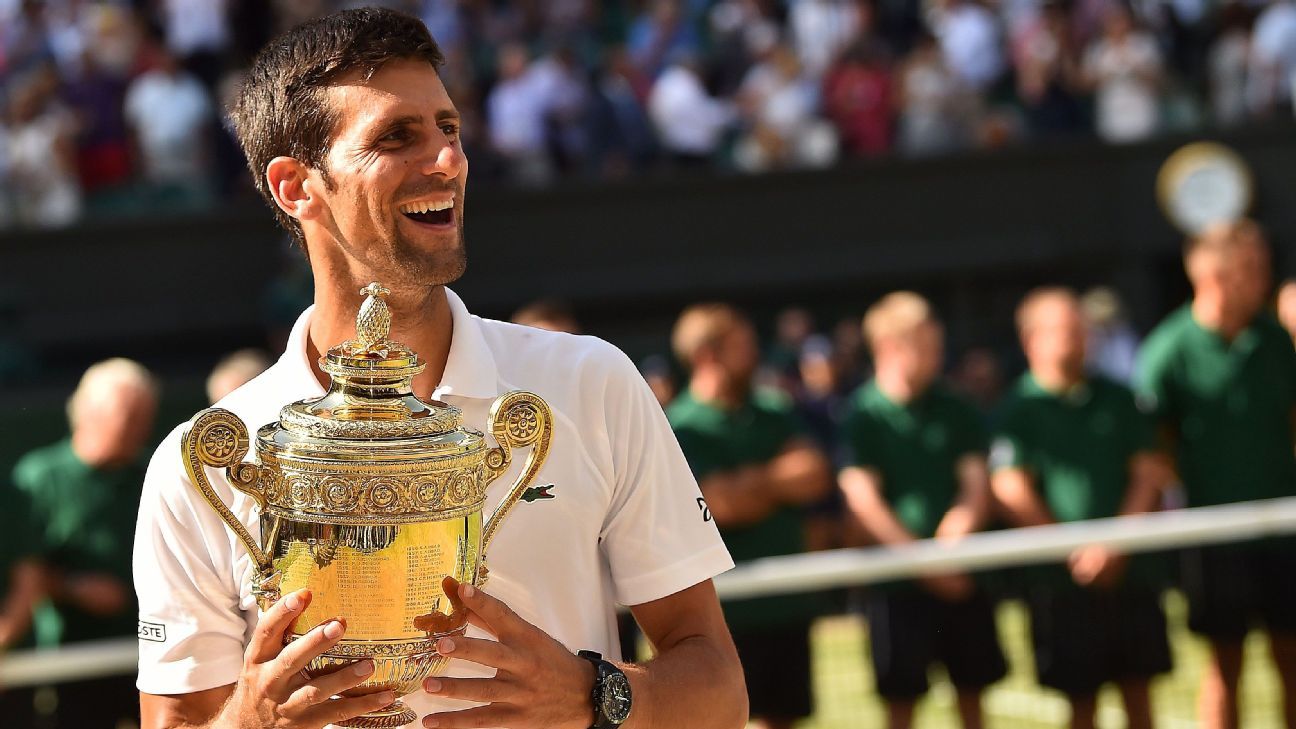WIMBLEDON — The “whap” of the ball striking the net tape and falling back was painful enough, seeming to echo in the silence of Centre Court before the umpire called, “Game, Djokovic.” But the really unnerving thing was the murmur from within the crowd that gradually grew louder, posing an uncomfortable question that couldn’t be ignored.
If Kevin Anderson, whose greatest weapon is his serve, couldn’t hold his very first service game, what could he do to compete against the best returner in the game in Sunday’s Wimbledon men’s final? The answer was implicit in Novak Djokovic‘s tidy, 2-hour, 19-minute deconstruction of Anderson’s big game: not much.
Before his 6-2, 6-2, 7-6 (3) loss Sunday, Anderson had played over 21 hours of tennis at this tournament, including over six and a half in his record-breaking semifinal win against American John Isner. Anderson’s legs were not ready; neither was his mind.
“The way the ball was coming off my racquet, sort of the quality of my footwork, my ball striking wasn’t where it needed to be to compete with somebody like Novak,” Anderson said afterward. “That’s tough. It’s tough being out there at that stage knowing you’re not playing the kind of tennis you want to play.”
The six other men Djokovic beat en route to the Wimbledon final — and, again, at the very top of the game — might have expressed similar sentiments. The larger question looming behind Djokovic’s accomplishment is: Will he be satisfied with emerging from his slump and re-establishing his Big Four credentials, or will he mount another campaign to dominate the way he did during those halcyon days between 2013 and 2016?
“I understand that people are questioning whether I can consistently play on this level. Trust me, I am, too,” Djokovic said in his postmatch news conference, a smile slowly spreading across his gaunt face. “At the same time, I can’t look too far down the road because I have to embrace and cherish this kind of accomplishment.”
Take that as a provisional “yes.” At 31, Djokovic is the youngest of the Big Four. True, this was only his 13th Grand Slam title (Rafael Nadal has 17, Roger Federer 20), yet Djokovic has a winning record against both (27-25 versus Nadal, 23-22 against Federer) and has routinely crushed the fourth member of the Big Four, Andy Murray (25-11). Still, Djokovic isn’t really spoken of in the same reverential tones as Federer or Nadal.
“Everyone loves Roger and Rafa; Novak is respected,” Boris Becker, who coached Djokovic through his recent dominant period, said during his BBC broadcast of the final. “It’s something that bothers him, but that love is something you can’t buy. He takes it personal, because that’s his character. He’s very sensitive.”
Djokovic might eventually belt his way to earn that love now that his game is back on track. It couldn’t have happened at a better time, or in a more appropriate place.
The pressure has been building during Djokovic’s comeback like steam in a plugged kettle. The cork finally blew out on Centre Court, where Djokovic’s childhood fantasies of conquest covered all the bases of the experience short of holding a postmatch news conference. “I dreamed of winning it when I was a 7-year-old boy,” he said. “I made a lot of improvised Wimbledon trophies from different materials.”
In winning his fourth Wimbledon crown, Djokovic established himself as a grass-court expert, second only among active players to Roger Federer. His win put him two titles ahead of Nadal, whom he beat in their memorable two-day semifinal. Sunday’s victory also elevated his total number of wins at Wimbledon to 64, one more than Djokovic’s childhood idol, Pete Sampras.
Those numbers might surprise someone who thinks of Djokovic as primarily a hard-court expert (he has six Australian Open titles and two at the US Open) who was weaned on clay. The full body of stats simply suggest he’s a master of all surfaces thanks to his exceptionally limber, lean body. It’s a biological machine that enables him to stretch and bend like a contortionist, cover the court like a center fielder and yet also drive forehands and serves with the power of a prizefighter.
“I have to be grateful for my body and to my body,” he said the other day when asked how he managed to transform a Nadal drop shot into a Djokovic winner. “I mean, we take things for granted sometimes, so I try to take care of my body. All my life, I’ve been really trying to be aware of my body, my mind and everything, work on getting myself to the optimal shape so I can do these kinds of elastic things on the court.”
The elasticity briefly turned brittle in the third set, and the Djokovic machine threatened to seize up as the end of his 24 months of trials and tribulations came into view. Could it really be, he wondered? Was that long and lesson-filled “journey” he kept alluding to about to come to an end? As the implication became a psychological backdrop, Anderson lifted his own game. He kept pace with Djokovic, exchanging service holds to build a 6-5 lead. He wasted two set points in getting there and had three more as Djokovic floundered.
“He was the better player, without a doubt,” Djokovic said of the third set. “I was just trying to hold on and keep my composure in decisive moments.”
That was no easy task, because right up and into this final, Djokovic wasn’t entirely convinced he was prepared to close this painful chapter of his career — a chapter that began with turmoil in his personal life, drifted into a period of soul-searching and house cleaning (Djokovic off-loaded his entire, successful support team only to rehire them earlier this year) and finally morphed into a saga of injury and rehabilitation.
Djokovic struggled with a painful elbow injury since last year’s Wimbledon but put off surgery until February. He said he returned too early and took his lumps, struggling in the spring and early summer. His confidence was damaged, the embers of doubt still glowing as recently as the French Open. “I had to learn the lessons in a hard way,” he said. “I did not expect to be back in the top shape already here in Wimbledon so quickly, [but] there is a part of me that always believes in my own abilities.”
It was that part of Djokovic that took hold of his racket under the mellow sunshine of a Sunday afternoon in London, hit a backhand passing shot past Anderson and fired an ace to force a third-set tiebreaker. Djokovic then rolled through, a Wimbledon champion again.

